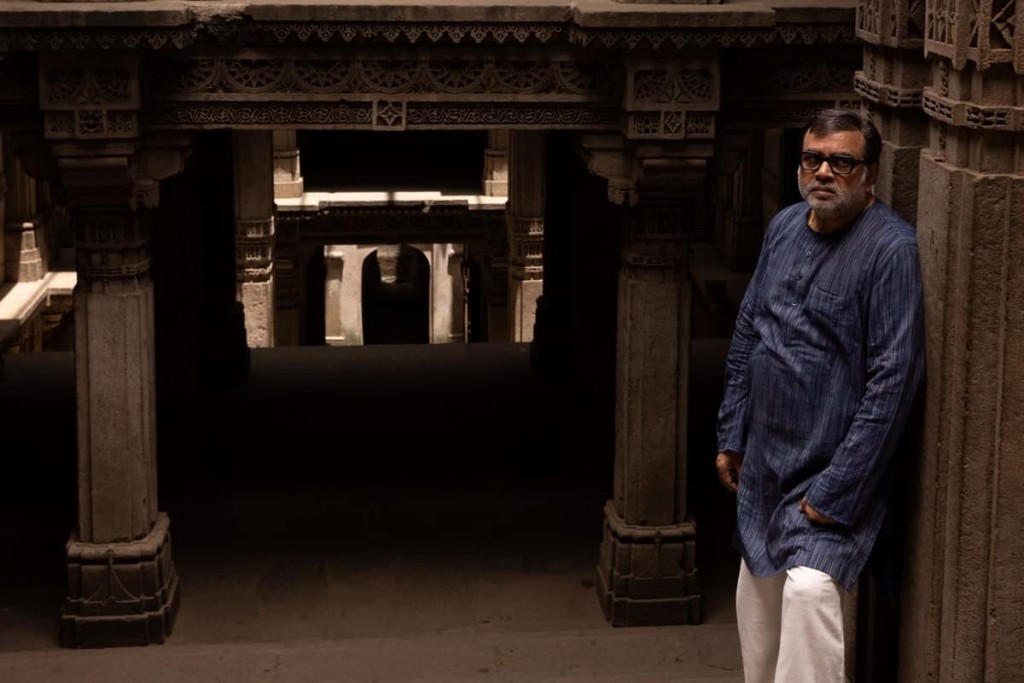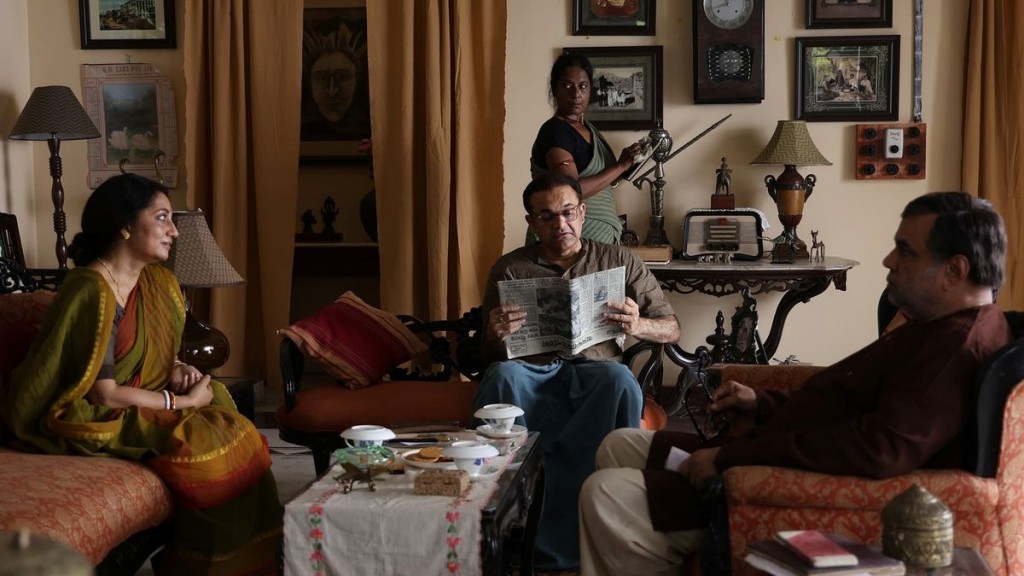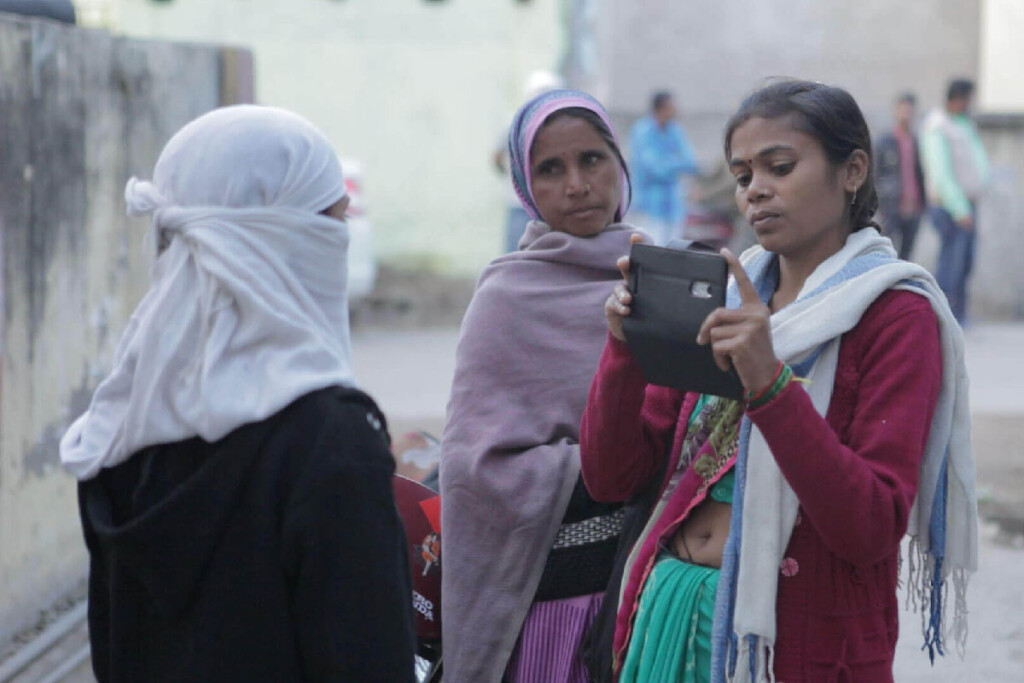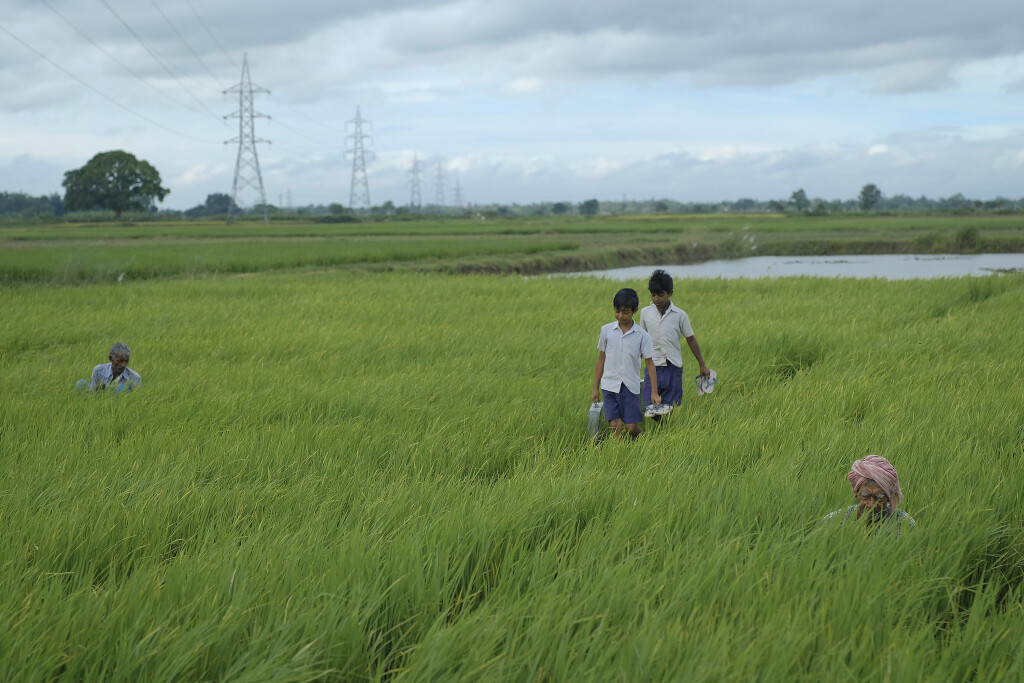The Storyteller
Words Sean Stillmaker
Lost loves, work/life imbalances, intellectual property infringement — these are universal themes, but they only transcend the test of time when in the hands of true storytellers. Satyajit Ray, the renowned auteur filmmaker, literary writer and multidisciplinary designer from Kolkata in West Bengal, is one of those masterful yarn spinners.
All of the above mentioned themes are present in his literary work Golpo Boliye (Bengali for The Storyteller). The piece was part of a series of 15 short stories published in 1985 that follows the character Tarini Khuro (Bengali for respected uncle).
Satyajit has always been a leading inspiration for Ananth Narayan Mahadevan, an acclaimed director, writer and actor of Hindi and Marathi films and tv productions. When Ananth secured the rights to adapt The Storyteller for the screen, he thought it would be an overnight done deal. Instead, it was three years of perseverance.
Good things come to those who wait, as a storyteller might say, which is certainly true after premiering The Storyteller in India at the International Film Festival of India in Goa. Before the projectors rolled at the INOX theatre, Ananth elaborated on the root of his inspiration for the film in front of the sold out show.
“When I first read the story, it was translated for me from Bengali to Hindi and I realised that Ray had done a very clever thing; he had brought a Bengali who couldn’t speak Gujarati and a Gujarati who couldn’t understand Bengali together. So the common means of communication was Hindi. This film could only be made in Hindi not Bengali,” says Ananth.
“So I thought, here was an opportunity to try and emulate the great master from one of his own stories. It must have been in a moment of madness and absolute, one would say, obsession with Ray that I decided to do it, and I followed it up with almost fanatic enthusiasm,” says the ever so energetically and spiritually youthful 72-year-old director.
Tarini Khuro the aged bachelor has become Tarini Ranjan Bandhopadhyay the retired widower in the film adaptation. The cinematic Tarini is still an engrossing storyteller, where we see throughout his life that friends and family would clamour him to sit down, pull out his ‘magic wand,’ which is a cigarette, and regale them with a ‘Tarini Tale.’

Tarini is exceptionally played by the Hindi actor with over 250 credits, Paresh Rawal, who expressively portrays the character with an appropriately delightful balance of pensive thought and sharp wit.
In the film, we’re immediately introduced to the character upon his retirement. Tarini is a man who’s had 73 jobs over his life and is now leaving Amrit Publishers in Kolkata where he’s worked for the last 13 months, one of his longest stretches in one place. It’s these life experiences in various vocations that fuel his knowledge to create such captivating stories. We’re also later told a healthy diet of fish helps because it keeps the mind sharp.
Only days go by before Tarini becomes restless sitting at home. Whether it’s fate or chance, he comes across a job opportunity for a storyteller in the northwestern state of Gujarat. As regret swirls in his head that he never took enough holidays with his wife before she passed away, he takes it as a sign that he could fulfill that wish, whilst staying occupationally active.
The approximate 1,300 mile journey from Kolkata to Ahmedabad takes just over a day by train. When Tarini arrives for the job interview, he is stunned that his services would be applied to a successfully aged bachelor rather than to a family with small children.
The wealthy entrepreneur is Ratan Garodia whose business is cotton exports. He’s in need of a storyteller for himself because he suffers from insomnia, Ratan claims. Tarini quickly fires back that it’s a condition he cannot personally relate to: ‘it’s a rich person disease, a side-effect of capitalism.’
The character of Ratan is played by the internationally acclaimed stage and screen Indian actor Adil Hussain. After the premiere in Goa, Adil elaborated on his thoughts and creative work at the film’s press conference.
“I’m proud to be part of this because of every sense of the word — story —the way it has been told, the way it has been written. Generally, most of the films we see that are made in our part of the world, they are poor in literature. And that needs to be worked upon in film writing. I think that is the weakest part in Indian films,” Adil says.
And so when the script arrived for him to read, jubilant elation could be inferred. “When I read the script, it felt very, very well written and I could smell Satyajit Ray speaking through the words and through the scenes.”
When it came to Satyajit’s original short story, Adil had read it when he was young, going back 30 years ago, he said. However, after being cast as Ratan, he was told not to revisit the original text.
“I had been asked not to. I remember when I asked Ang Lee, when I did his Life of Pi, ‘should I read the book?’ And he said, ‘please don’t.’ A film version of a story is so different than what is written. It’s a different language. It’s a different way of expressing a story,” Adil says.

Literature is front and foremost throughout Ananth’s film, which was masterfully adapted by Kireet Khurana. Not only does the script deliver succinctly profound witticism in playful dialogue, but literature in its various forms play a central role.
Ratan has an extensive library, but confesses he has no time to read. The only book he does read is his business accounting book, but he basks in the thought that perhaps through possessing a collection, the knowledge will somehow transfer.
It’s near his book collection that Tarini musses at a painting, Pablo Piccaso’s ’37 surrealist The Weeping Woman. Although Ratan’s wealthy stature might be able to afford the original, the painting he confesses is ‘a copy.’ Although innocently said at the time, the choice of words echoes ominously after the film’s climax, as does the famous Picasso quote that, “good artists borrow, but great artists steal.”
Whilst working in Ahmedabad, Tarini befriends a librarian, wonderfully played by Tannishtha Chatterjee. Her character is a pivotal fulcrum in the third act setting off unexpected twists related to plagiarism and karma in the remaining two acts.
At the press conference she expanded upon her artistic ethos and laughingly acknowledged her flights of fancy regarding intellectual property ranging from storytelling to music and beyond.
“As an artist, I feel the world should be free,” Tannishtha says. “I know the producers may not agree because they put in so much money that way. Cinema is a very expensive art form, or a form of expression where commerce is involved a lot, but art is to communicate; it’s to have a dialogue.”
Immediately upon making the statement, Tannishtha laughed whilst looking at producer’s Suchhanda Chatterjee bewildered expression. Suchhanda and Shubha Shetty of Quest Films were responsible for the years long campaign of finding the partners to collaborate on this journey in bringing the exquisite film to life.
“All credit to the director. He had loved the story and went ahead and bought the rights from Satyajit Ray and afterwards approached us. We just saw the story and obviously what is there not to love about the story,” Shubha says.
Suchhanda went further elaborating on how every studio turned them down until years later they found an eager partner with Jio Studios and were finally able to let the cameras roll. With The Storyteller now out in the world, Suchhanda reflected on the film’s concluding message.
“If you see the last scene of our film, it is told that how can you compare a storyteller and a storywriter. Who’s bigger? Nobody’s bigger; they’re equal, maybe… it was beautifully done and yet there was a strong message to the plagiarism,” Suchhanda says.
Related Reading







 @majesticdisorder
@majesticdisorder